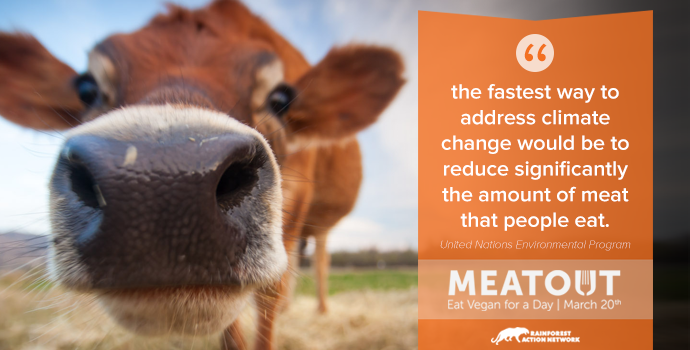March 20th is an international day of action organized by Farm Animal Rights Movement (FARM) that encourages the public to eat wholesome, nutritious plant-based foods for just one day. Called Meatout, the international campaign is part of a growing global movement that draws attention to the increasingly clear connection between industrial meat production and climate change, environmental degradation and animal abuse.
Altogether, our industrial agriculture system is driving a whopping one third of greenhouse gas (GHG) emissions. The UN Food and Agriculture Organisation (FAO) estimates that livestock contributes up to 18% of those emissions according to the Food and Climate Research Network. Therefore it’s no surprise that two of the most credible sources on the science behind climate change, United Nations Environmental Program and Nature Climate Change, suggest that “the fastest way to address climate change would be to reduce significantly the amount of meat that people eat.”
A global shift to a plant-centered diet is necessary to avoid some of the worst impacts of animal agriculture on the environment, from water pollution to greenhouse gas production to habitat destruction. Stand for science and the health of the planet by joining RAN and our allies to celebrate Meatout’s 30th anniversary!
Have you ever wondered why when the causes of climate change are discussed, fossil fuels always top the list without mention of animal agriculture? Oil, natural gas and especially coal are definitely major sources of human-caused emissions of carbon dioxide and other greenhouse gas (GHGs) emissions. But what about the commodities feeding our industrial food system, and especially those feeding the animal agriculture industry? Corn and soy are mass produced to feed our industrialized food system and few people realize how much of them go to feed the animals in factory farms.
The continued industrialization of several key commodities ie. – palm oil, pulp & paper, soy, corn and beef – poses serious risks to global forests and climate change.
According to the Climate Land Use Alliance, commercial agriculture drives 71% of tropical rainforest destruction, which is astounding. Although the number for livestock commodity production is much less, it’s a big part of this equation. Given the massive climate foodprint of industrial meat production – from the huge swaths of rainforest that get converted for the production of livestock and feed, to the reliance on a broken system of genetically engineered commodities like corn and soy, it’s paramount that we address the environmental destruction caused by our current food system.
A recent Mongabay article reported that rising meat consumption has pushed past deforestation as a global warming driver. A meat-eater’s typical diet is responsible for almost twice as much global warming as your typical vegetarian’s and almost triple that of a vegan, according to a report published in the journal Climatic Change last summer. One Oxford University study suggested that cutting your meat intake in half could cut your carbon footprint by more than 35 percent. Beef is particularly damaging to the planet. According to the National Academy of Sciences, it results in five times more GHG emissions than pork or chicken, while requiring 28 times more land and 11 times more irrigation water.
Although it’s a good place to start, we can’t solve this planetary crisis by transitioning to a plant-based diet alone. Even though global demand for meat is increasing, US consumption has more or less leveled out (however the US does account for a large percentage of global meat consumption – we eat 50% more capita than Europe and 3 times that of other countries according to the Environmental Working Group Meat Eaters Guide). If we’re serious about mitigating the climate impacts of industrial meat, we must address meat consumption while challenging agribusiness practices and the structures that allow them so much room to maneuver.
RAN whole-heartedly supports Meatout and other meat reduction campaigns as a starting place, and also invites you to go one step further and take action to address commodity production and the corporations driving it. For example, right now Big Food lobbyists and PR machines are spending millions of dollars to stop a historic win for people, animals and the planet. This year’s new dietary recommendations are a dramatic shift from previous guidelines in the fact that they direct the U.S. government to recommend a healthier diet for the American public that defies Big Food lobbyists’ efforts to promote foods that cater to the junk food industry and factory farm profits. Stand up for healthy food and a healthy planet, add your name to our petition demanding that US Government agencies adopt 2015 Dietary Guidelines that prioritize the environment!












